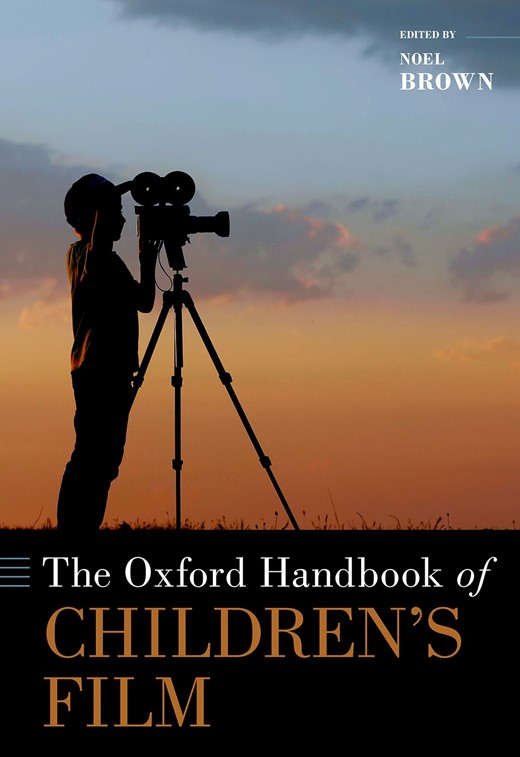 The Oxford Handbook of Children's Film
The Oxford Handbook of Children's Film
Contents
-
-
-
-
-
-
-
-
-
-
-
-
-
Identifying the Tween Identifying the Tween
-
The Tween On-Screen The Tween On-Screen
-
Studying the Tween Studying the Tween
-
The Embryonic Tweens The Embryonic Tweens
-
Twenty-First-Century Tweens Twenty-First-Century Tweens
-
Conclusion Conclusion
-
Filmography: Tween Films, 2000–2020 Filmography: Tween Films, 2000–2020
-
Notes Notes
-
Bibliography Bibliography
-
-
-
-
-
-
-
-
-
-
-
-
-
12 The American Tween and Contemporary Hollywood Cinema
Get accessTimothy Shary has published extensively on ageing representation in cinema. His studies of youth include Generation Multiplex: The Image of Youth in Contemporary American Cinema (University of Texas Press, 2002; rev. ed. 2014) and Teen Movies: American Youth on Screen (Wallflower 2005); and he edited Youth Culture in Global Cinema (University of Texas Press 2007) with Alexandra Seibel. He recently authored Boyhood: A Young Life on Screen (Routledge 2017), about the 2014 Richard Linklater film Boyhood, and edited the collection Cinemas of Boyhood: Masculinity, Sexuality, Nationality (Berghahn 2021). He teaches at Eastern Florida State College in Palm Bay, Florida.
-
Published:20 April 2022
Cite
Abstract
The “tween” population (youth between eleven and thirteen years of age) has become an increasingly vital and distinctive demographic for American cinema, both as a target audience and as subjects for stories. This chapter chronicles the evolution of the tween in American culture through the rise of middle schools, which codified the age group in the mid-twentieth century, and reveals a subsequent correlation with the film industry’s making and marketing of movies meant to appeal to tweens. Certain concerns are evident across the films about these characters—family reunification, romantic curiosity, and influential friendships—that speak to the burgeoning interests of early adulthood for their protagonists. At the same time, those interests reveal the ongoing perceptions of the adults who make the films, indicating the delicate liminal state that early adolescence poses for everyone who lives through it.
Sign in
Personal account
- Sign in with email/username & password
- Get email alerts
- Save searches
- Purchase content
- Activate your purchase/trial code
- Add your ORCID iD
Purchase
Our books are available by subscription or purchase to libraries and institutions.
Purchasing information| Month: | Total Views: |
|---|---|
| October 2022 | 4 |
| November 2022 | 2 |
| December 2022 | 2 |
| January 2023 | 5 |
| February 2023 | 6 |
| March 2023 | 7 |
| April 2023 | 6 |
| May 2023 | 5 |
| June 2023 | 7 |
| July 2023 | 2 |
| August 2023 | 8 |
| September 2023 | 5 |
| October 2023 | 2 |
| November 2023 | 4 |
| December 2023 | 2 |
| January 2024 | 3 |
| February 2024 | 1 |
| March 2024 | 4 |
| April 2024 | 5 |
| May 2024 | 10 |
| June 2024 | 2 |
| July 2024 | 1 |
| November 2024 | 2 |
| December 2024 | 2 |
| January 2025 | 5 |
| February 2025 | 5 |
| March 2025 | 2 |
| April 2025 | 3 |
| May 2025 | 1 |

Get help with access
Institutional access
Access to content on Oxford Academic is often provided through institutional subscriptions and purchases. If you are a member of an institution with an active account, you may be able to access content in one of the following ways:
IP based access
Typically, access is provided across an institutional network to a range of IP addresses. This authentication occurs automatically, and it is not possible to sign out of an IP authenticated account.
Sign in through your institution
Choose this option to get remote access when outside your institution. Shibboleth/Open Athens technology is used to provide single sign-on between your institution’s website and Oxford Academic.
If your institution is not listed or you cannot sign in to your institution’s website, please contact your librarian or administrator.
Sign in with a library card
Enter your library card number to sign in. If you cannot sign in, please contact your librarian.
Society Members
Society member access to a journal is achieved in one of the following ways:
Sign in through society site
Many societies offer single sign-on between the society website and Oxford Academic. If you see ‘Sign in through society site’ in the sign in pane within a journal:
If you do not have a society account or have forgotten your username or password, please contact your society.
Sign in using a personal account
Some societies use Oxford Academic personal accounts to provide access to their members. See below.
Personal account
A personal account can be used to get email alerts, save searches, purchase content, and activate subscriptions.
Some societies use Oxford Academic personal accounts to provide access to their members.
Viewing your signed in accounts
Click the account icon in the top right to:
Signed in but can't access content
Oxford Academic is home to a wide variety of products. The institutional subscription may not cover the content that you are trying to access. If you believe you should have access to that content, please contact your librarian.
Institutional account management
For librarians and administrators, your personal account also provides access to institutional account management. Here you will find options to view and activate subscriptions, manage institutional settings and access options, access usage statistics, and more.